Mark DeJesus's Blog, page 123
March 4, 2015
#045: Clearing Up the Fog In Our Relationships [Podcast]
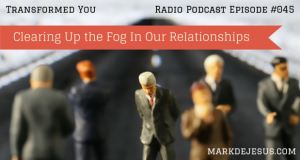
In today’s episode, we are going to confront one of the most dangerous strongholds that hinder healthy relationships–rejection. Listen in as we discuss how rejection creates a fog in our relationships that keep us from fruitfulness and clear interactions.
Rejection will program us out of our own brokenness to overcompensate in relationships, or not bother trying at all. Mark and Melissa will share their own individuals struggles they had to confront.
In this episode, we address some questions that are important to ask when it comes to detecting rejection in our lives:
Do the constantly feel insecure in relationships?
Do you easily become hurt and offended with people?
Do you struggle to know who you are?
Do you struggle with addictions?
Do people find that you are super sensitive?
Do peoples accusations stick to you and wont let go?
Do you “OVER TALK” in conversations? accomplishments? Or don’t bother talking at all?
Brian Regan: The “Me Monster”:
3 Questions to Ask to Turnaround Your Relationship Struggles:
What can I change, heal or grow in this?
What is the negative story that needs to change? What story do I need to be following?
What can I bring to the relationship vs take from it?
Prayer for Discerning a Rejection Spirit:
Father God, I come to you in Jesus’ name, and I thank you that there is an opportunity for me to delve further into love and healing. I am starting to see that where I have not been loved properly has had an affect on my life. I need a deeper understanding of Your love and acceptance for me. I want you to come and show Your love to me. I also ask that you show me where rejection has become a lens on my perspective, so that I can begin to take my freedom back and stop living a defeated life. Help me to have discernment, so that I am not blind to what is keeping me in bondage. I know you have freedom for me from rejection. I ask that You meet me as I take this journey of freedom. Amen.
Recommended Resources:
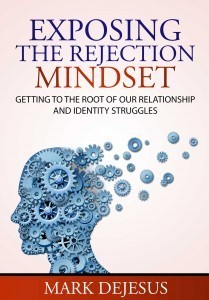
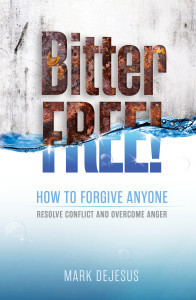

If you don’t see the player, click here to listen.


Comments: #045: Clearing Up the Fog In Our Relationships [Podcast].
Comments policy
February 25, 2015
#044: Breaking Bad Relationship Ties – Part 2 [Podcast]
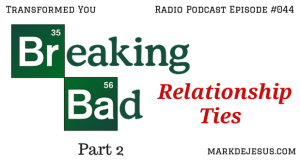
In part 2, we continue to address relationship ties, both good and and bad. But more specifically, we help you unlock how to break free from unhealthy relationship ties that keep you bound, limited or stuck.
Included in this episode are the following insights:
Unhealthy ties with people that are long and gone.
Stagnant relationships that keep us from growing.
Ties to things in this world that keep us from going all in.
Personal stories from Mark and Melissa regarding unhealthy ties they have had to work through.
Steps to take to break unhealthy relationship ties.
Recommended Resources:
Free Audio Teaching on Codependency
Insights into Overcoming Guilt
Insights into Overcoming Jezebel
Want to get Mark’s teaching archive and stay in touch with his weekly messages? Join our subscription today by clicking here.
If you cannot see the player, click here to stream or download.
Question: Where are you learning about bad relational ties that is helpful for you and your journey? (Comment below)
Comments: #044: Breaking Bad Relationship Ties – Part 2 [Podcast].
Comments policy
February 23, 2015
[New Book] Bitter Free! is Here: Get Your Copy Today – Watch this Video
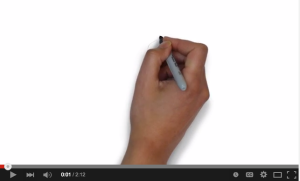
If you do not see the video, click here to watch.
Click Here to Get Your Copy Today!
Comments: [New Book] Bitter Free! is Here: Get Your Copy Today – Watch this Video.
Comments policy
February 18, 2015
#043: Breaking Bad Relationship Ties – Part 1 [Podcast]
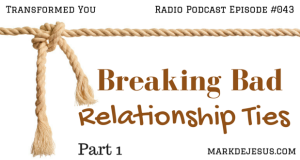
In this episode, we want to bring out the power involved in being relationally tied to someone. God intended for it to be a good thing, where we learn the power of covenant and commitment in relationship. Through this unity, we share with each other a spiritual bond that is meant for God’s glory and a compounding effect in our world.
Relationship ties can also be something where we become tied to junk that came into our lives as a result of a relationship bond that was not healthy. Learn how you can begin to detect unhealthy relationship ties in your life.
In this episode we discuss:
What a relationship tie or soul tie is?
How God designed relationship ties to be used for His good.
What a bad relationship tie does.
What are the traits of having bad relationship ties?
What are the kinds of ungodly relationship ties that can form?
If the audio player does not appear, click here to listen or download.
Question: Where do you think bad relationship ties affect people the most? Write your response in the comment section below.
Comments: #043: Breaking Bad Relationship Ties – Part 1 [Podcast].
Comments policy
February 16, 2015
#042: The Ties that Bind – An Interview with Brian Holmes [Special Edition Podcast]
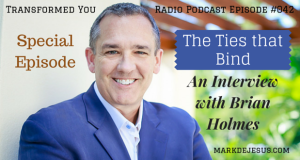
In this special edition episode, I took the opportunity to let you in on some time I spent talking with Brian Holmes, the Founder and President of Strategic Living Institute, a company dedicated to Transforming Minds – Developing Leaders – and Changing Nations.
The Strategic Living Institute (SLI), is a life changing organization dedicated to teaching people to harness the power and potential that God has given them. SLI’s mandate and method is revolutionary, providing individuals the opportunity and means to receive inner life healing, purpose specific training and development, and the practical activation necessary to be mobilized as leaders of cultural transformation. Each year, Brian travels extensively, speaking in conferences and leadership forums around the world.
Brian is a counselor, pastor of Covenant International Worship Center in the Dallas, Texas area, Author, Lecturer, Life, business and leadership coach and mentor. He has also authored a book, The Ties that Bind: Identifying and Breaking Unhealthy Soul Ties, a book that he teaches around the world.
I have been enjoying getting to know Brian and his ministry work. He carries a heart of the Father’s love and real deal approach to life and growth. I thought I would let you in on some time I spent with him in this episode. Enjoy
Brian’s resources and site can be found at brianholmes.com.
Comments: #042: The Ties that Bind – An Interview with Brian Holmes [Special Edition Podcast].
Comments policy
February 14, 2015
Facing and Breaking Our Codependency Patterns [Audio Teaching]
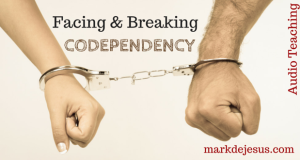
I never had more kick back in a message than in this one. Talking about codependency stirs up a lot of our junk and really confronts how we do relationships. Many of our relationship circles can become so tainted with the poison of this monster, keeping us from growing to our optimum level in life.
It can be so easy to blame our situation on someone else because we have become tied to them in such an ungodly manner. If you listen with an open heart, you can be dramatically changed from living in codependent relationships or living in codependent patterns.
If you do see the player, click here to stream or download the teaching.
Excerpts From “Love is a Choice” by Robert Hemfelt
The Definitive Book of Letting Go of Unhealthy Relationships
Codependency was first recognized several decades ago as counselors endeavored to help alcoholics and their families. In the vanguard of this movement was Alcoholics Anonymous. The founders of AA observed several things about alcoholics: they were deeply embittered towards God; they were rebellious (independent), and at the same time they were childishly dependent upon those around them.
Although the first AA workers themselves knew God intimately, they felt that in some way they had to sidestep this bitterness towards God using the phrase “God as I understand him” in their now-famous twelve steps. Their intentions was to focus on the need for outside help. The alcoholic addictions was fought inch by inch, day by day through application of the steps and attendance at meetings with fellow alcoholics.
AA was successful in rescuing alcoholics, but there was serious fallout—the families were coming apart within a year after the alcoholics dried out. Workers realized that just as the alcoholic was dependent upon his or her alcohol, the family very frequently had become just as dependent upon the alcoholism. They had adjusted not only their whole lives but also their whole way of perceiving life to accommodate the alcoholic. They enabled that person to keep the habit up; they denied; they ignored; they circumvented/ To the kids especially, this warped life with an alcoholic parent was normal. It was all they knew. The alcoholic was dependent upon the alcohol. The family was codependent upon alcoholism along with the alcoholic. Thus was born the need for the term. . . .
The concept of dependency and codependency is no longer limited to alcohol; it takes in the rest of the chemical spectrum—coke, pot, tobacco, heroin, and beyond. The “beyond” includes nearly any obsessive compulsion, a thing or a behavior carried to excess. Eating disorders, sex addiction, rage-aholism, workaholism, the compulsion to spend and spend, an extremely rigid and legalistic approach to living, the compulsion to wash one’s hands fifty-five times a day—these and other addictions have been placed in the same class as alcoholism. These disorders and others affect the family and close associates—the codependents—who may suffer as severely as the depended or more so.
From Mental Health America (formerly Nat. Mental Health Association)
Co-dependency is a learned behavior that can be passed down from one generation to another (so we know there can be a generational aspect to this. It is an emotional and behavioral condition that affects an individual’s ability to have a healthy, mutually satisfying relationship. It is also known as “relationship addiction” because people with codependency often form or maintain relationships that are one-sided, emotionally destructive and/or abusive. The disorder was first identified about ten years ago as the result of years of studying interpersonal relationships in families of alcoholics. Co-dependent behavior is learned by watching and imitating other family members who display this type of behavior.
Codependent Literally Means: “dependent with”
In alcohol or drug addiction, many think of the alcoholic as the only one being codependent. This is not true. The drug addict or alcoholic is dependent on the substance. The spouse or loved one is dependent upon the addict in an attempt to help rescue the addict when in reality, there is a great deal of enabling going on. The two become dysfunctional dependent on each other – codependent.
Quote from Love is a Choice:
In its broadest sense, codependency can be defined as an addiction to people, behaviors, or things. Codependency is the fallacy of trying to control interior feelings by controlling people, things, and events on the outside. To the codependent, control or lack of it is central to every aspect of life. The codependent may be addicted to another person. In this interpersonal codependency, the codependent has become so elaborately enmeshed in the other person that the sense of self – personal identity – is severely restricted, crowded out by that other person’s identity and problems.
Additionally, codependents can be like vacuum cleaners gone wild, drawing to themselves not just another person, but also chemicals (alcohol or drugs, primarily) or things – money, food, sexuality, work. They struggle relentlessly to fill the great emotional vacuum within themselves.
From Parlay International:
Codependency has many characteristics, which vary dramatically from person to person, but the central characteristic is the same. The codependent pays tremendous attention to the actions and feelings of others and neglects his or her own needs. The codependent is always reacting to another, rather than acting for for himself. Some common characteristics of codependents can include: worrying and anxiety, “bending over backward” to take care of others, not knowing or not trusting one’s own feelings, feeling guilty for “not doing enough,” feeling isolated or depressed. Staying in bad relationships (or even sabotaging potential- good ones) trouble with emotional intimacy or sex, workaholism, lack of energy and low self-esteem.
Common Characteristics among Codependents
My feelings about who I am stem from being loved by you.
My good feelings about who I am stem from receiving approval from you.
Your struggle affects my serenity.
My mental attention focuses on solving your problems.
My mental attention is focused on pleasing you.
My mental attention is focused on protecting you.
My self-esteem is bolstered by solving your problems.
My self-esteem is bolstered by relieving your pain.
Your behavior is dictated by my desires as I feel you are a reflection of me.
I am not aware of how I feel. I am aware of how you feel.
I am not aware of what I want – I ask what you want.
The dreams I have for my future are linked to you.
My fear of rejection determines what I say or do.
My fear of your anger determines what I say or do.
I use giving as a way of feeling safe in our relationship.
My social circle diminishes as I involve myself with you.
I put my values aside in order to connect with you.
I value your opinion and way of doing things more than my own.
The quality of my life is in direct relation to the quality of you.
My happiness hinges on others.
I feel responsible for too many.
I am a master of denial and repression.
I worry about things I can’t change and I try to change them.
My life is punctuated by extremes.
I am constantly looking for the something that is missing or lacking in my life.
Even though deep down inside I want good relationships—I stay in bad relationships and sabotaging good relationships.
I have trouble with emotional intimacy
Not realizing that you can’t change others, you can only decide to change yourself.
I do not know the difference between doing things in love and in guilt.
Codependency’s Ways:
Codependency often relies upon another person their source for their sense of identity, love and happiness and even help. (It is my conviction that this is not just about someone who has a relationship with an addict, although that may be a big part of it.)
The addiction involves another person.
Can be a parent regarding their child.
A wife and her husband and vice versa
A dating relationship
A friendship
People in a congregation and a pastor or leader
Codependency usually starts off with someone deeply caring for another person. But later on, they compulsively react to that person’s behavior and they try to control it. They also become enmeshed into the other person’s identity. The codependent pays a great deal of attention to the actions and feelings of another while neglecting their own needs. The codependent reacts to another, rather than acting for him or her self. In the process, they lose proper understanding of love – love for one’s self a proper understanding of self-respect and boundaries in relationships.
From Celebrate Recovery: In Christian circles, when you meet a believer who is codependent, many of the words and manifestations can look like and sound like Christian virtues and values, unless you are discerning.
We have to be very careful we don’t use some of these lines to protect our codependent behaviors:
Christians are supposed to put others first.
Christians should give themselves away.
“I am all about serving”
Martyrdom is often portrayed.
This is where the victim mentality becomes so predominant.
Self-Pity
There is a twisting spirit – diluting the Scriptures. It doesn’t bear witness with truth. They use them to stay in very dysfunctional relationships.
Jesus was the ultimate example of walking without codependency.
Note: Relying on God, the Word of God, the Holy Spirit is not codependent. The world may try to say that, but it is not true. Fully relying on God fills that void within that God designed. If we don’t, we can all in some way be drawn to becoming codependent upon someone else.
Note: Being knit to the church body is not codependence – interdependence, and there is a difference.
Matthew 12:43-50 (NKJV)
43 “When an unclean spirit goes out of a man, he goes through dry places, seeking rest, and finds none.
44 Then he says, ‘I will return to my house from which I came.’ And when he comes, he finds it empty, swept, and put in order.
45 Then he goes and takes with him seven other spirits more wicked than himself, and they enter and dwell there; and the last state of that man is worse than the first. So shall it also be with this wicked generation.”
46 While He was still talking to the multitudes, behold, His mother and brothers stood outside, seeking to speak with Him.
47 Then one said to Him, “Look, Your mother and Your brothers are standing outside, seeking to speak with You.”
48 But He answered and said to the one who told Him, “Who is My mother and who are My brothers?”
49 And He stretched out His hand toward His disciples and said, “Here are My mother and My brothers!
50 For whoever does the will of My Father in heaven is My brother and sister and mother.”
Jesus and the Crowd: study how often he actually withdrew from the crowd – to be alone – to pray – to be with his disciples . . .
Jesus words to break free from codependency:
Mark 12:30-31 (NKJV)
30 And you shall love the Lord your God with all your heart, with all your soul, with all your mind, and with all your strength.’ This is the first commandment.
31 And the second, like it, is this: ‘You shall love your neighbor as yourself.’ There is no other commandment greater than these.”
From Love is a Choice:
Jesus taught the value of the individual. He said we are to love others equal to ourselves, not more than. A love of self forms the basis for loving others. The differences between a life of service and codependency take several forms. Motivation differs. Does the individual give his service and himself out of free choice or because he considers himself of no value? Does he seek to “please people”? Does he act out of guilt and fear? Does he act out of a need to be needed (which means he actually uses the other person to meet his own needs; the ‘helpee’ becomes an object to help the helper achieve his own goals).
Service is to be an active choice. The person acts; codependents react. Codependents behavior is addictive rather than balanced. Codependents control the person instead of the person being in charge of their own life. Codependents have poor sense of boundaries; they help others inappropriately (when it creates dependency on the part of the other person rather than moving that person toward independence). They have trouble setting limits for themselves and allow others to invade their boundaries.
A codependent’s sense of self-worth is tied up in helping others; Christianity says that a person has worth simply because he is a human being created in God’s image. Ones self-worth is separate from the work one does or the service one renders. Codependents have difficulty living balanced lives; they do for others at the neglect of their own well-being and health; Christian faith calls for balanced living and taking care of oneself. Codependent helping is joyless; Christian service brings joy. Codependent are driven by their inner compulsions; Christians are God-directed and can be free from compulsiveness, knowing that God brings the ultimate results.
Examples Where Codependence Can Operate:
Any close relationship with an addict.
Spouse relationship with an addict – don’t make any boundaries – driven by guilt and a false view of love.
Avoiding glaring issues
Tolerating abuse
Sweeping things under the carpet
“calling evil good in the name of love”
Parent who wont demonstrate strong/tough love when needed
Not allowing children to work through consequences
Not Discipling Your Child or Teaching them to Honor the Lord
1 Samuel 2:22-36 (NKJV)
22 Now Eli was very old; and he heard everything his sons did to all Israel, and how they lay with the women who assembled at the door of the tabernacle of meeting.
23 So he said to them, “Why do you do such things? For I hear of your evil dealings from all the people.
24 No, my sons! For it is not a good report that I hear. You make the Lord’s people transgress.
27 Then a man of God came to Eli and said to him, “Thus says the Lord: ‘Did I not clearly reveal Myself to the house of your father when they were in Egypt in Pharaoh’s house?
29 Why do you kick at My sacrifice and My offering which I have commanded in My dwelling place, and honor your sons more than Me, to make yourselves fat with the best of all the offerings of Israel My people?’
30 Therefore the Lord God of Israel says: ‘I said indeed that your house and the house of your father would walk before Me forever.’ But now the Lord says: ‘Far be it from Me; for those who honor Me I will honor, and those who despise Me shall be lightly esteemed.
In church and ministry life, things can get really codependent:
Pastor jumping to every need of the congregation out of guilt and false burden bearing. Not hearing from God about situations and problems first.
I am responsible to you not for you.
Effective ministry works both ways…sheep and shepherd….equipper and those being equipped…helper and those who want to be helped and are going after it.
An earthly person can become becomes a dysfunctional source in life.
ENABLING:
Enabling is defined as reacting to a person in such a way to shield him or her from experiencing the full impact of the harmful consequences of behavior. Enabling behavior differs from helping in that it permits or allows the person to be irresponsible.
PROTECTION from natural consequences of behavior.
KEEPING SECRETS about behavior from others in order to keep peace. lying
MAKING EXCUSES for the behavior. (School, friends, legal authorities, work,
family members.)
BAILING OUT of trouble. (Debts, fixing tickets, paying lawyers, providing jobs.)
BLAMING OTHERS for persons behavior. (Friends, teachers,
employers, family, self.)
SEEING THE PROBLEM AS THE RESULT OF SOMETHING ELSE. (Shyness,
adolescence, loneliness, child, broken home.)
AVOIDING confrontation and avoiding taking a stance to keep peace. (Out-of sight, out-of mind.) That is a peace-keeper not peace maker.
GIVING MONEY from an unhealthy motivation of guilt or need to please.
ATTEMPTING TO CONTROL. (Planning activities, choosing friends, getting
jobs.)
MAKING THREATS that have no follow through or consistency.
TAKING CARE OF the person, doing what he/she should do for themselves.
Key Point: Those who struggle with codependency often need healing from past abusive relationships and un-dealt with suppressed emotions and hurt – otherwise being in dysfunctional relationships will always seem normal.
Recovery from codependency involves learning to take responsibility for our own actions, feelings behavior, issues and lives.
Letting go of the need to control people, places and events is difficult, but will ultimately set us free of our self-defeating patterns, shame and fear.
How is Co-dependency Overcome?
Issues stem to childhood
Getting in touch with feelings that have been suppressed.
Receive Healthy love from a biblical standpoint
Learning to take responsibility for your life and freedom.
Comments: Facing and Breaking Our Codependency Patterns [Audio Teaching].
Comments policy
February 11, 2015
#041: Does Forgiving Mean Forgetting? [Podcast]
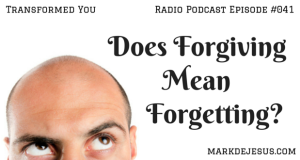
Today’s episode focuses on a question that was sent into us regarding brokenness and forgiveness.
Jesus Martinez from East Hartford, Connecticut asks:
What’s the difference between a broken heart and a soul wound? Or are they both the same ? Also, what does it really mean to say I can forgive but not forget? Can we truly forgive someone if we can’t forget what’s been done?
If you do not see the player, click here to download or stream the episode.
Question: After listening, what questions do you have regarding dealing with brokenness and walking through forgiveness?
Comments: #041: Does Forgiving Mean Forgetting? [Podcast].
Comments policy
February 7, 2015
Understanding the Battle of Obsessive Compulsive Disorder (Audio Teaching)
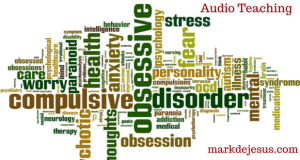
Listen into this 27 minute teaching as I help break down the battleground of what is diagnosed as Obsessive Compulsive Disorder or OCD. This battleground has become so common that saying you are “having an OCD fit” or describing someone as “OCD” is pretty mainstream in culture.
But what is going on spiritually in someone who struggles with either diagnosed OCD or has trouble with obsessive thoughts that don’t want to leave? Find out how OCD is actually connected to the battleground of addictions and learn to see the spiritual battle behind this struggle. Begin to take your freedom back as you learn some tremendous insights!
Running Time: 27:45
Click Here if the Player Does Not Automatically Show
Question: Which part of this teaching helps you the most in understanding this battleground. (Comment Below)
Comments: Understanding the Battle of Obsessive Compulsive Disorder (Audio Teaching).
Comments policy
February 4, 2015
#040: Addressing Condemning Christians [Podcast]
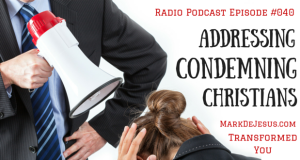
The topic of today’s episode is based on a question that was sent in by one of our listeners.
QUESTION: I am just wondering if fire and brimstone legalistic Christians have a bad approach……Does God want us to shout “REPENT OR BURN IN HELL!” I would not say that is not very loving execution of the gospel. Even if they did repent and turn to Jesus they probably still have those desires they need to work through. I assume they would be afraid to discuss it after being made to feel worse than the average sinner. My whole point is should these sort of “scare tactic” Christians be avoided and ignored? Or does God actually work that way sometimes.
Also, should Christians threaten other Christians with repent or burn in hell, are you ready for the rapture, blood moons, fireballs from heaven because of sexual sin, and all other scary aspects of Gods wrath toward fallen man? Basically should these things be used as teaching tools amongst believers? On the other hand should we use these scary attributes of God to reach the lost? Because I have seen these tactics directed at Christians and also directed at the lost by well meaning christians…but honestly it messes up my perception of God if i let it sometimes and talking with many atheists they have expressed they only see an angry God. I will use a quote from a song that gives me panic “His return is very soon so you BETTER be believin that our God is an awesome God” many Christians base there entire theology on that excerpt from our god is an awesome God.
Question: In what ways has this episode helped you, click on the comment section below and tell us your thoughts.
Click Here to Listen to Download to Stream the Episode
Comments: #040: Addressing Condemning Christians [Podcast].
Comments policy
February 2, 2015
Bitter Free! to be Released February 23!
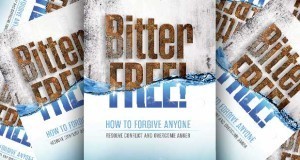
I am thrilled to let you know that my latest book, Bitter Free! is officially being released Monday February 23.
Do you want to forgive but struggle with how to do it?
Do you find yourself getting angry a lot?
Do you struggle to resolve conflicts in your life?
In this book, I will expose the work of bitterness as a trap in your life, intended to keep you from healthy and whole relationships. Through straight forward insights and practical application, you will learn to free yourself of a root of bitterness so that you can take your life back, bitter free!
This book will not only show you the importance of forgiveness, but expose what keeps you from being able to forgive.
You will be equipped in this book to:
Break down the armor that bitterness uses to keep you angry, hurt and offended.
Disarm all works of bitterness in your life, including unforgiveness, resentment, “get even” kind of thinking and judgmentalism.
Walk through an effective process to forgive absolutely anyone, no matter how badly they hurt you.
Increase your ability to love and see people the way God sees them.
Do more than “manage” anger battles. Get free from them!
Practice guaranteed conflict resolution principles.
Live out forgiveness in any situation.
Includes special reference sections that address the hard issues of relationship struggles.
I would love to do a giveaway, so to the first 5 people who email me with a request, will get a free pdf download copy today!
Comments: Bitter Free! to be Released February 23!.
Comments policy












